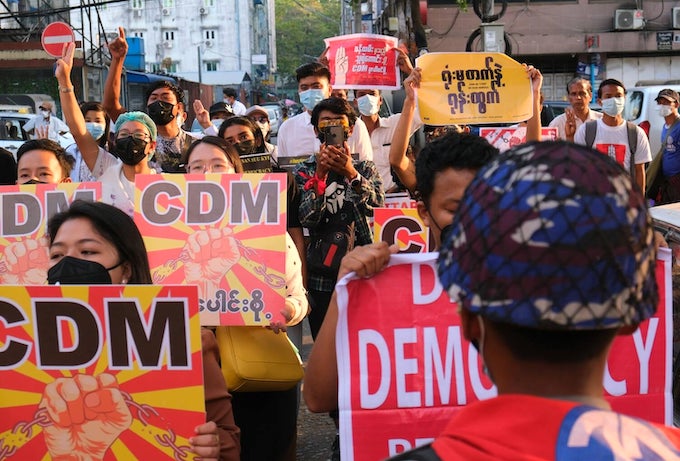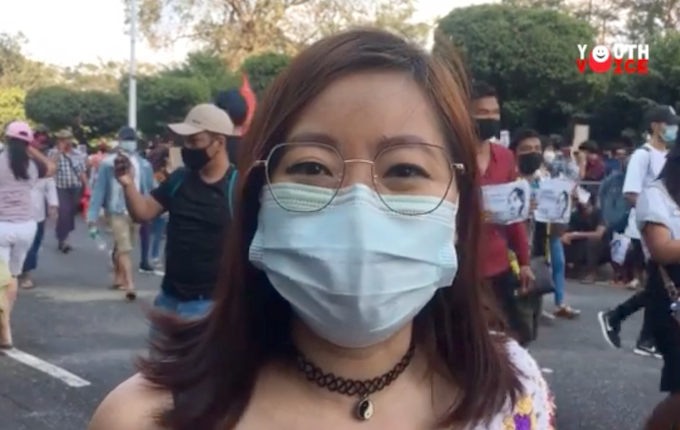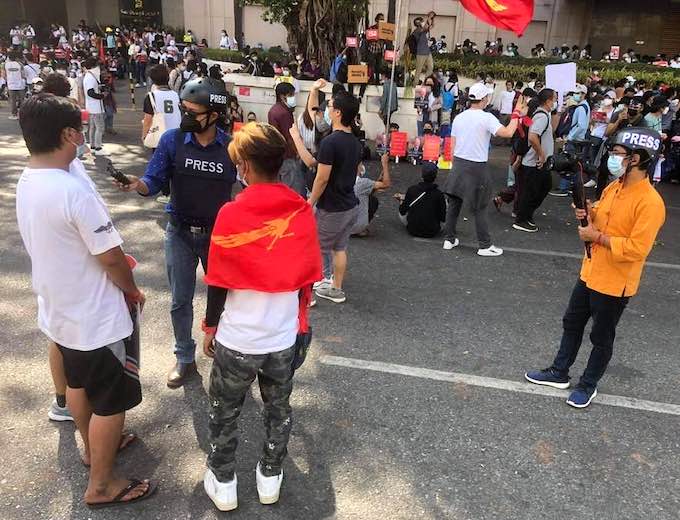
Street protests of the 'Civil Disobedience Movement' (CDM) are streamed live on social media. Photo: DVB
In the middle of a night replay of ‘Youth Voice’ the screen suddenly freezes. That’s how the coup d'état on February 1st starts for viewers of DVB TV news, Myanmar’s independent news channel. In the capital Naypyidaw the entire leadership of the semi-civilian government is arrested by the army. Overnight the poorest country in Southeast Asia becomes a military dictatorship, again.
by Ole Chavannes, 19 februari 2021
I’ve been working with journalists from the Democratic Voice of Burma (DVB) since 2008. First we launched the children’s TV news program ‘Youth Voice’. At that time Myanmar was also a dictatorship; press freedom was strictly forbidden. DVB produced it ‘underground’ with hidden cameras and smuggled tapes across the border. It was a complex and dangerous time, with 17 journalists ending up in jail.
Thanks to the exile media, millions of people could listen to the shortwave radio and watch the satellite tv secretly at night during all those dark years. Despite all the propaganda and censorship, most people knew what was really going on in their country. At the time the junta called DVB, together with the BBC and VOA ‘the lies from the sky’.

Youth Voice continues to air, but is now presented from the street. Photo: DVB
DVB had become the number 3 watched channel last year, by covering corona continuously. The previous underground reporters built up the TV station step by step in Yangon since 2012. DVB TV reached full legal acknowledged only recently, with granted access to the ‘digital terrestrial signal’ in 2018 by the Ministry of Information. It’s the signal with the biggest national audience reach, directly competing with the state, commercial and military channels. The switch that connects all these satellite signals is controlled by … the army.
Like they own almost everything valuable in Myanmar. The military elite is enriching itself by controlling large chunks of the economy: beer, tobacco, construction, harbours, weapons, drugs etc. Apparently the ‘democratic experiment’ as they call it, was becoming too ‘successful'. The army thrives by violence and corruption, not transparency and accountability that make a modern democracy.
The biggest difference between the previous dictatorship and the years of relative freedom is probably the access to internet. This virtual gateway on each mobile phone to the rest of the world opened up minds and sparked new ideas. Ideas can’t be cut off. DVB’s Facebook collected within a few years over 15 million followers and is growing faster again since the coup.
Despite regular internet cuts, the tech savvy reporters manage to upload dozens of videos a day, often even live streams of protests. DVB’s programs switched from studio into street-based formats within a week. The Youth Voice presenter now stands in the middle of a street protest, somewhere in the city. It makes them hard to catch. Until now, one DVB reporter was arrested in Mandalay and already released.

Interviewing in the middle of the protest. Screenshot: DVB
As long as the internet is not blocked, you can see in real time what a military coup d’état actually means, simply by watching the live streams on facebook.com/DVBTVnews. If the internet is blocked, we will find another way. Did the general underestimate the power of the people? DVB news will tell.
-----------------------------------------------------
I've shared my insights in Dutch media here>
Feb 1: NOS Radio1 Journaal (from 8:37 min)
Feb 1: NOS.nl news article
Feb 1: NOS/NTR Nieuwsuur (from 24:35 min)
Feb 8: VPRO Bureau Buitenland (from 6:45 min)
Feb 17: NU.nl/podcast (from 5:30 min)
